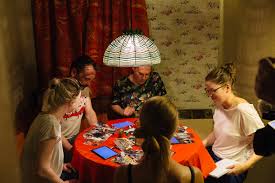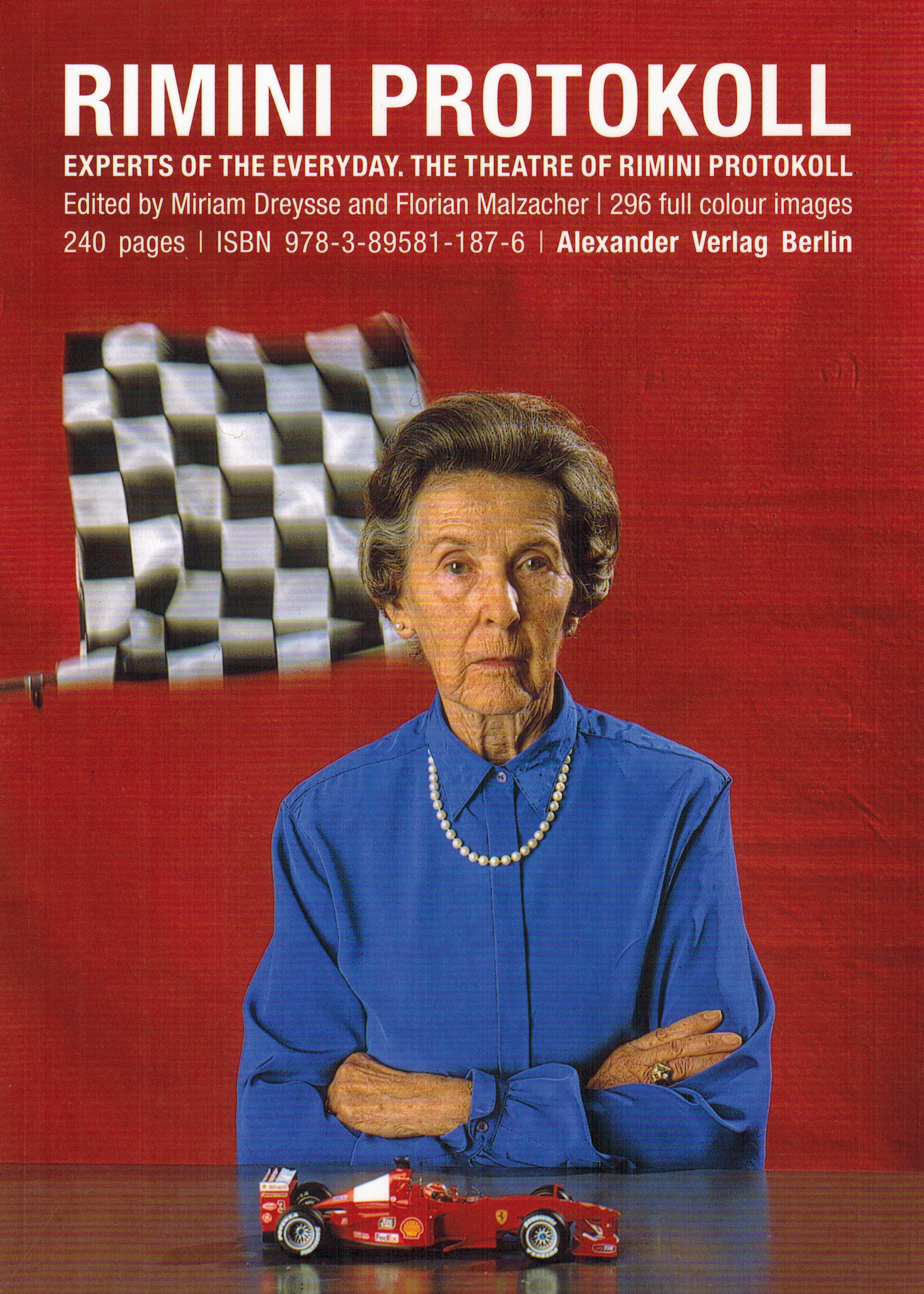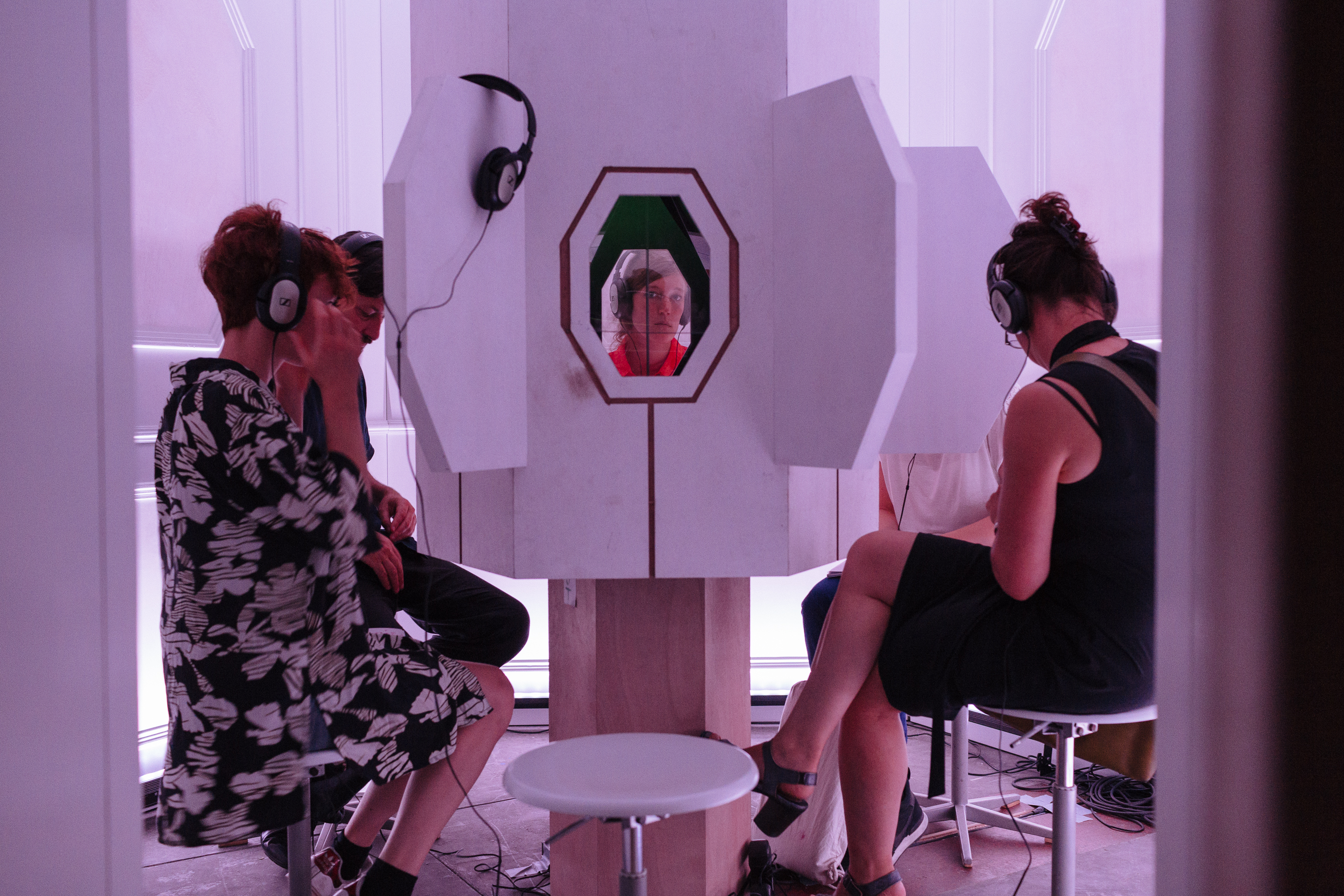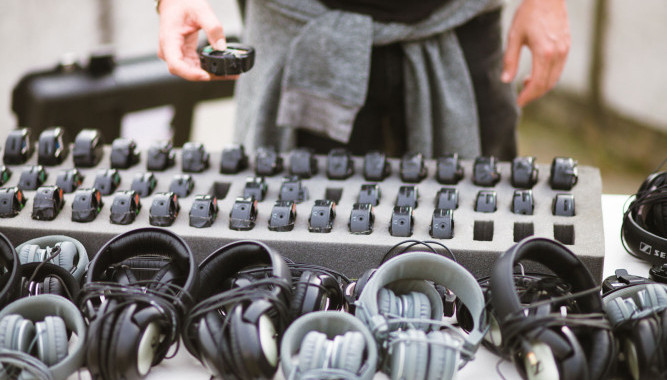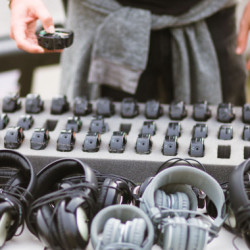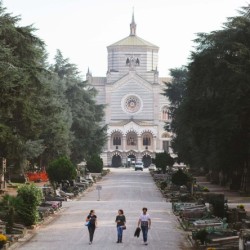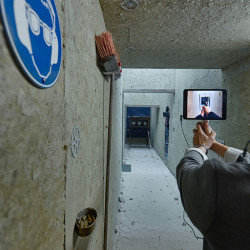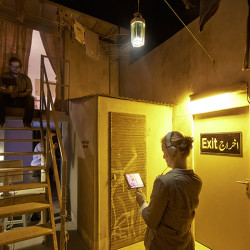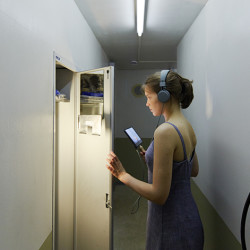Nachlass, pièces sans personnes de Stefan Kaegi et Dominic Huber (Rimini Protokoll).
Archivi tag: Rimini Protokoll
Nachlass, pièces sans personnes de Stefan Kaegi et Dominic Huber (Rimini Protokoll). Videodoc #liberiamogliarchivi
City as stage Rimini Protokoll- DO’s & DON’Ts1133
https://www.rimini-protokoll.de/website/de/videos
La città è un vasto laboratorio per osservare il comportamento umano quotidiano, e ci sono regole in questo laboratorio. Ci sono cose da fare e da non fare. Cosa è permesso e cosa è meglio non? Cosa è richiesto da me e che libertà ho? Cosa non dovrei pensare? Che ne dici di vivere senza regole? E quali regole abbiamo bisogno in futuro? Gli spettatori di questo pezzo siedono in un camion, che è stato trasformato in un auditorium mobile. Attraverso una grande finestra, si affacciano sulla città. Durante il viaggio, il sistema del nostro ordine urbano viene osservato: leggi, regole, norme, rituali, accordi espressi e non detti, codici visibili e invisibili..

Concetto / testo / regista: Helgard Haug / Jörg Karrenbauer Concetto / Drammaturgia: Aljoscha Begrich
Books: Rimini Protokoll Edited by Miriam Dreysse and Florian Malzacher818
Edited by Miriam Dreysse and Florian Malzacher
240 pages | 296 full colour images | ISBN 978-3-89581-187-6 | 19.90 Euro | Alexander Verlag Berlin
Available at: www.alexander-verlag.com.
Elderly ladies, teenagers, unemployed air traffic controllers, talented mayoral candidates, Vietnam soldiers, counsellors, Bulgarian longdistance lorry drivers, Indian call centre workers – “real people” are always at the centre of Rimini Protokoll’s directorial work. Experts of their daily lives, they are the defining aspect of the documentary work of Helgard Haug, Stefan Kaegi and Daniel Wetzel. It is rare that the clash between fiction and reality is made so clear, and simultaneously so emotional and playful, as in the theatre of Rimini Protokoll.
In this volume, journalists, academics and artists present and reflect upon the stage productions, as well as the site-specific works, audio tours and radio pieces of the successful trio of directors. With numerous colour photographs and a complete catalogue of works.
Articles by Eva Behrendt, Miriam Dreysse, Ehren Fordyce, Heiner Goebbels, Hans-Thies Lehmann, Florian Malzacher, Annemie Matzke, Tobi Müller, Priyanka Nandy, Matthias Pees, Rimin Protokoll, Kathrin Röggla, Jens Roselt und Gerald Siegmund.
Co-produced by Institut für Angewandte Theaterwissenschaft (Universität Gießen), Kunstenfestivaldesarts (Brussels), National Theatre School Continuing Education (Copenhagen), Project Arts Centre (Dublin), PuSh International Performing Arts Festival (Vancouver)
Rimini Protokoll
Helgard Kim Haug, Stefan Kaegi and Daniel Wetzel form a team of author-directors since 2000. Their works in the realm of theater, sound and radio plays, film and installation emerge in constellations of two or three and solo as well. Since 2002, all their works have been written collectively under the label Rimini Protokoll. At the focus of their work is the continuous development of the tools of the theater to allow unusual perspectives on our reality.
For example, Haug/Kaegi/Wetzel have declared a Daimler Shareholder Meeting to be a piece of theater or staged 100 % Stadt (100 % City) with 100 statistically representative residents of cities like Berlin, Zurich, London, Melbourne, Copenhagen, or San Diego. In Berlin and Dresden, they developed accessible Stasi installations/sound plays in which the observation protocols could be listened to on android telephones. In Hamburg they staged “Weltklimakonferenz – a simulation of the UN Conference on climate change. At the moment they are creating the tetralogy ‘Staat 1-4’ and focus on post-democratic phenomena.
They have been awarded the NRW Impulse Preis for Shooting Bourbaki (2003); Deadline (2004), Wallenstein – eine dokumentarische Inszenierung (2006) and Situation Rooms (2014) were invited to the Berliner Theatertreffen. Schwarzenbergplatz was nominated for the Austrian theater prize Nestroy in 2005. Mnemopark was awarded the Jury Prize at the festival “Politik im freien Theater” in Berlin in 2005, and in 2007 Karl Marx: Das Kapital. Erster Band (Haug / Wetzel) won both the audience prize at Festival Stücke 2007 and the Mülheimer Dramatiker Preis that same year.
In November 2007, they were awarded a special prize at the Deutscher Theaterpreis Der Faust, in April 2008 they were awarded the European Theatre Prize for the category “new realities.” In 2008, they were awarded the Hörspielpreis der Kriegsblinden for Karl Marx: Das Kapital, Erster Band (Peymannbeschimpfung was also nominated).
Rimini Protokoll was awarded the Faust Theatre Prize in 2007, the European Prize for New Theatre Forms in 2008 and in 2011 the silver lion of the Biennale for Performing Arts in Venice. The multi-player video-installation “Situation Rooms” about the weapon-industry received the Excellence Award of the 17th Japan Media Festival. In 2014, Helgard Haug und Daniel Wetzel were awarded the “Deutscher Hörspielpreis der ARD” and received the “Deutscher Hörbuchpreis der ARD” in 2015. And in 2015 Stefan Kaegi and Rimini Protokoll got the Swiss Grand Prix of Theatre.
Rimini Protokoll is based at HAU, Berlin, since 2003.
Rimini Protokoll NACHLASS. PIÈCES SANS PERSONNES, Territory Festival, Moscow814
Nachlass: German word composed of «nach» (after) and the verb «lassen» (to leave). «Nachlass» corresponds to the whole of material and immaterial goods left by a deceased person.
In a more specific sense, especially in research, «Nachlass» indicates the totality of records (letters, works, documents…) that were in possession of a person or a collection that a person has built during his or her lifetime.
What will remain of myself after my “self” is gone? How have I lived my life? How will those whom I love continue to live after my departure? Will I stay alive in their memories even after my death? And up to which point and until when will these memories persist? This installation of the main European theatre innovators Rimini Protokoll is not only about death, but how do you find your way to pass away, and that this way is very personal and irreversible. Eight rooms and eight stories of people, who made a decision to get ready for the death in advance. They do want to face her fully armed and leave us, living, a message.
Coproduction : Rimini Apparat Schauspielhaus Zürich Bonlieu Scène nationale Annecy et la Bâtie-Festival de Genève dans le cadre du programme INTERREG France-Suisse 2014-2020 Maillon, Théâtre de Strasbourg-scène européenne Stadsschouwburg Amsterdam Staatsschauspiel Dresden Carolina Performing Arts
With the support of : Fondation Casino Barrière, Montreux Le Maire de Berlin – Chancellerie du Sénat – Affaires culturelles
With the support for touring of Pro Helvetia – Swiss arts council
Creation on September 14th 2016 at the Théâtre de Vidy, Lausanne
http://territoryfest.com/playbill/nasledie/
The performance goes on The English and French laguages with the Russian subtitlings
Duration – 1:50
without interval
Winzavod
st. metro Kyrskaya/ Chkalovskaya
4-й Сыромятнический пер., 1/8, стр. 6
Photos © Samuel Rub
Rimini Protokoll a Milano- 17 settembre – 25 ottobre 2015387
REMOTE MILANO by RIMINI PROTOKOLL
Una colonna sonora scritta per Milano che trasforma il viaggio urbano in un film collettivo.
Una performance urbana per 50 partecipanti che sono al contempo attori e spettatori, osservatori e osservati, individui e orda.
Gli altri ascoltano ciò che ascolto io?
Come potremo prendere decisioni comuni?
L’intelligenza artificiale dirige, ma stimola anche una percezione alterata che spinge a guardare la realtà e se stessi con sguardo del tutto nuovo.
Luogo di partenza: Ossario del Cimitero Monumentale – (entrata dall’ingresso principale)
Orari: giovedì e venerdì ore 15.00
sabato e domenica ore 11.30 e ore 15.00
NB: Lo spettacolo è itinerante, dura circa 80 minuti e sarà percorso a piedi
I posti limitati.
Biglietti:
intero €18.00 + prevendita
ridotto €13.00 + prevendita (studenti, under 18, over 60)
I biglietti si ritirano il giorno della performance direttamente al punto di partenza.
La versione in inglese di Remote Milano è disponibile tutte le domeniche alle 11.30.
Info per gruppi in inglese: biglietti@zonak.it +390297378443
INFORMAZIONI FONDAMENTALI PER PARTECIPARE A REMOTE MILANO
Siete pregati di presentarvi al punto di partenza 20 minuti prima dell’inizio per ritiro biglietti e preparazione.Trattandosi di un percorso a tappe obbligate l’orario di partenza è improrogabile. Lo spettacolo è itinerante, dura circa 80 min e sarà percorso a piedi. Si raccomanda di munirsi di scarpe comode e impermeabile in caso di pioggia. Nel luogo dell’incontro vi sarà chiesto un documento come cauzione per l’uso del navigatore.
Idea, testo e regia: Stefan Kaegi, co-regia: Jörg Karrenbauer; sound design: Nikolas Neecke; drammaturgia: Juliane Männel, Aljoscha Begrich; sound editing e assistenza alla regia: Ilona Marti; direzione di produzione: Caroline Gentz. “Remote X” è una produzione di Rimini Apparat; in coproduzione con HAU Hebbel am Ufer di Berlino, Maria Matos Teatro Municipal e Goethe-Institut Portogallo, Festival Theaterformen Hannover/Braunschweig, Festival di Avignone, Theater Spektakel di Zurigo, Kaserne Basel. Con il sostegno di: Hauptstadtkulturfonds Berlin, la fondazione svizzera Pro Helvetia. In coproduzione con House on Fire e con il sostegno del Programma Cultura dell’Unione Europea. Voci di Acapela Group. Per Milano, assistente alla regia: Federica Di Rosa; direttore di produzione e traduzione italiana: Valentina Kastlunger (ZONA K); traduzione inglese: Eva Oltivanyi
Con il contributo di Comune di Milano, Regione Lombardia; con il patrocinio e sostegno del Consolato Generale della Repubblica Federale di Germania a Milano; Con il patrocinio di Goethe-Institut Milano; un’iniziativa ExpoInCittà
RIMINI PROTOKOLL : LE THÉÂTRE EN MODE PARCOURS DOCUMENTAIRE361
Extract by: MCD.COM essay by Laurent Catala
Pionnier du théâtre expérimental et multimédia, le collectif berlinois Rimini Protokoll invite dans Situation Rooms le public du théâtre des Amandiers de Nanterre à une expérience scénographique à mi-chemin de l’immersion déambulatoire et du web-documentaire.
Médecin de MSF, gestionnaire international des systèmes de défense, ouvrier d’usine de minutions, réfugié syrien, ou encore enfant-soldat, le parcours imbriqué que constitue Situation Rooms et auquel le collectif berlinois Rimini Protokoll convie vingt spectateurs-usagers pour chacune de ses représentations au théâtre des Amandiers de Nanterre prend de multiples visages.
Si ceux-ci tournent tous autour la guerre [le terme de Situation Room lui-même a été emprunté à la célèbre photo où l’on voit Barack Obama dans son bureau entouré de ses collaborateurs au moment de la traque ultime d’Oussama Ben Laden], de l’armement et des dommages collatéraux humains, réels ou programmés (le cynisme du pilote de l’Indian Air Force quand il vante les valeurs de progrès qu’incarne l’utilisation en devenir des drones de combat), ils ne cèdent jamais complètement au pathos que la vision brusque de tels portraits pourrait induire. Il n’y a pas de temps pour cela.
Car muni de votre iPad et de votre casque audio, lâché dans un décor coulissant et interchangeable de bureaux, de laboratoires, de salles de conférences ou de zones de conflit, où les différentes notions de perspectives et d’espaces ne cessent de changer, vous n’avez finalement ni le choix des armes, ni celui de la réflexion. Par période de sept minutes, vous allez incarner successivement dix avatars sur les vingt que compte au total ce dispositif aux allures de jeu vidéo en mode réalité augmentée lo-fi. Et vous confrontez en quelque sorte à la double sensation d’être à la fois la victime et le bourreau, quand vous passez de la compassion du chirurgien pour les blessés qu’il soigne à la morgue morbide du trafiquant de drogue mexicain quand il énumère ces chers disparus.
(continua su MCD.COM)

